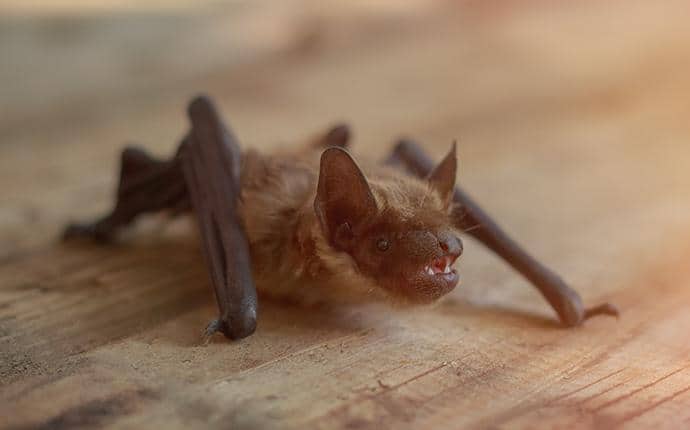Bats
Chiroptera

What do bats look like?
In the Pacific Northwest, the little brown bat is one of the most common species of bats. Small in stature (as their name suggests), little brown bats grow up to 3 ¾ inches long with a wingspan of 8 to 11 inches. This type of bat has fur that ranges from tan to dark brown fur with hints of gray, leathery wings, round black ears, and a brown nose.
Why do I have a bat problem?
If your property provides food and water sources, bats are likely to show up. Trees, shrubs, vegetation, gardens, pools, ponds, and birdbaths all attract insects which in turn attract the bats that feed on them. Bats also have a tendency to roost on homes, garages, barns, and other buildings. Bat infestations are common in attics, chimneys, under roof eaves, and behind shutters and loose roof shingles. Here in Central Washington, we find bats are also highly attracted to metal roofs.
How do I know if bats are in my house?
You’re more likely to notice bats in the evening hours when they are most active. If bats have taken up residence in or on your home, you may see them entering or exiting the structure at dawn or dusk. Other signs of a bat infestation include:
- Piles of bat droppings or guano built up under roosting sites. Very similar in appearance to rodent droppings, property owners in Washington often find accumulations of bat droppings on their porches and think it’s from rodents
- Bat urine running down the walls
- Oil marks near entry and exit points
- Scratching, tapping, or chirping sounds coming from ceilings, behind walls, or in attic spaces
- Bat sightings inside your home
Are bats dangerous?
Yes, bats carry pathogens that can be dangerous to humans. They are also known carriers of rabies (click the link for more information on rabid bat activity in Washington) and can introduce parasites like fleas, mites, and bat bugs into your home.
Fungus found in guano is another health concern associated with bats. The fungus called Histoplasma capsulatum can lead to serious health risks including lung disease in humans. Bats also contaminate attic insulation, building materials, and belongings with their droppings and urine.
How do I get rid of bats?
Because bats are capable of biting and/or scratching, it is best to avoid contact with them. If you’ve discovered bats in the attic or have found them roosting elsewhere, please contact Prosite for professional bat control and exclusion services. Our team has the experience, knowledge, and equipment needed to remove bats from homes and other buildings.
How do I prevent problems with bats?
To keep bats from infesting your structure, Prosite recommends implementing the following bat prevention tips:
- Seal any and all potential entry points along your roofline or elsewhere on the structure.
- Cap chimneys
- Install bat houses on your property
- Reduce mosquito activity and other insect populations
- Use lighting to deter bats from roosting

Our Reputation Speaks for Itself!
Read Our Reviews
Serving Ellensburg, WA Since 2011
-
"100% Recommend!"Thomas was our technician and he was phenomenal and thorough.- Sara H.
-
"Great As Usual!"We met our new technician, Michael, he is very knowledgeable and friendly.- Betty M.
-
"Kind & Patient Service"Alex and Fitz were great! Thank you, Prosite. They were thorough, knowledgeable, and professional.- Pamela P.
-
"Great Experience!"Alex politely and professionally described the areas he inspected and serviced in the crawl space of our home and the exterior outside.- Jerry S.
-
"Winning Service!"We appreciate Prosite because they are prompt at responding to issues that arise, and they have kept their promise to free our 'new to us' home of rodents.- Jamie H.
-
"Great Quality at a Fair Price"Prosite has the best customer service. Every time I call they are so easy to work with to meet our needs.- Cheryl A.





